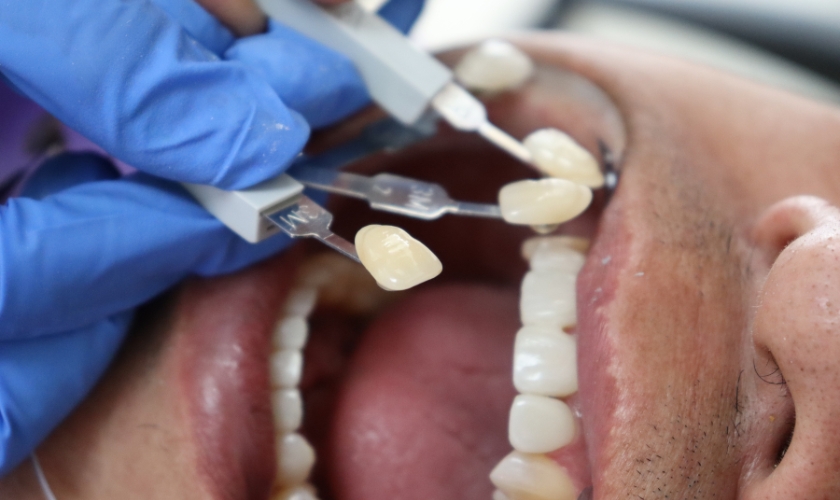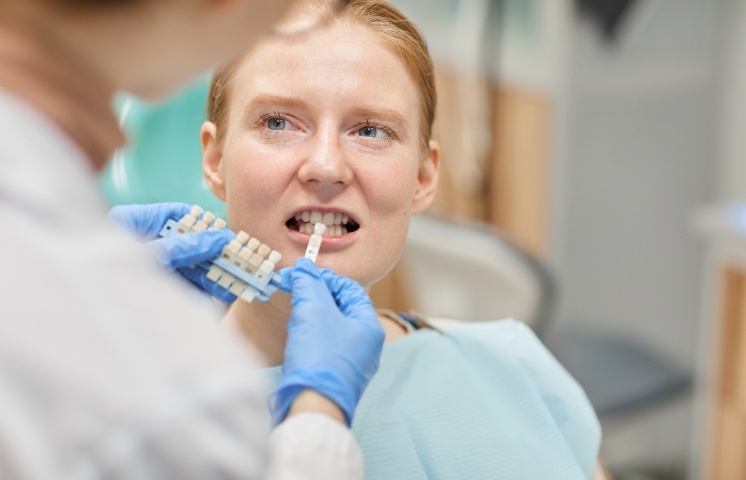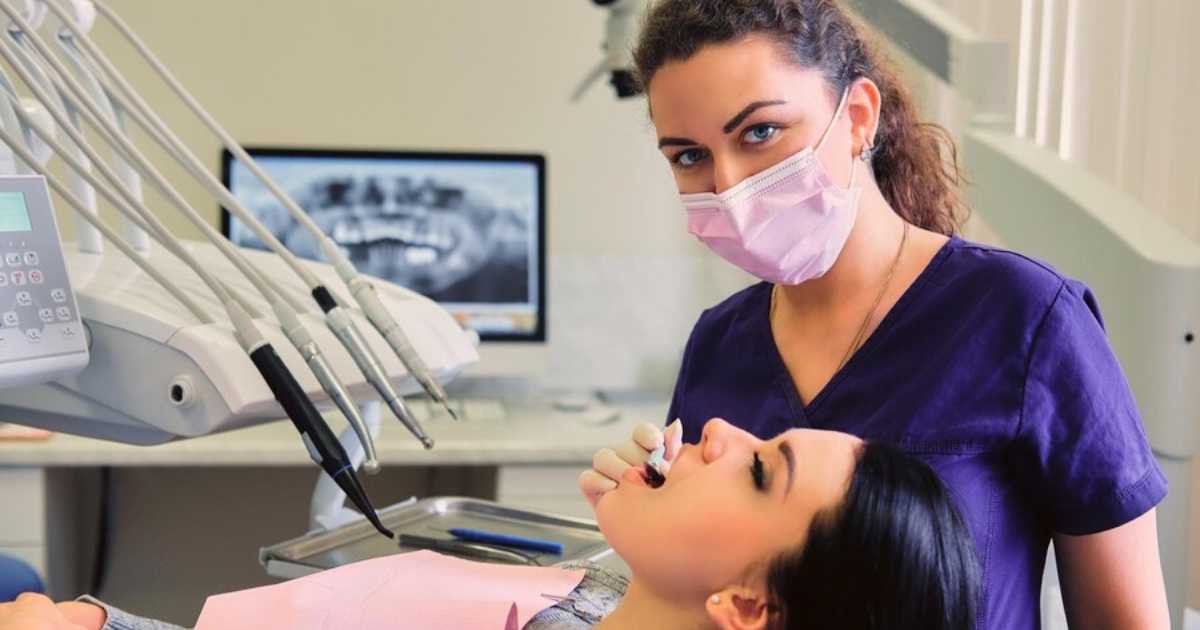We are not a registered Medicare/Medicaid Provider

A dental crown is a tooth-shaped cap that is cemented onto a damaged or weakened tooth. It restores the tooth’s shape, size, strength, and appearance. Crowns are typically made from porcelain, metal, or a combination of both.
There are several reasons why a dentist might recommend a dental crown:
- To protect a severely damaged or decayed tooth from further breakage
- To restore a fractured or cracked tooth
- To support a large filling
- To improve the appearance of a discolored or misshapen tooth
- To anchor a dental bridge (a replacement for missing teeth)
There are different types of dental crowns available, each with its own advantages and disadvantages. Here’s a quick breakdown of the common types:
- Porcelain Crowns: These crowns offer the most natural-looking aesthetics but may be more susceptible to chipping.
- Metal Crowns: Highly durable and long-lasting, but the metal color might be noticeable.
- Porcelain-Fused-to-Metal Crowns: A good balance between aesthetics and strength. The metal base provides support, while the porcelain exterior offers a natural look.
- Gold Crowns: Very durable but the least aesthetically pleasing option.
Benefits of Dental Crowns
Dental crowns offer a variety of advantages for your oral health and overall well-being. Here are some of the key benefits:
- Improved Chewing: Crowns restore the full functionality of a damaged tooth, allowing you to chew comfortably and effectively. This is especially important for maintaining a balanced diet.
- Enhanced Aesthetics: Crowns can significantly improve the appearance of your smile. They can cover up discoloration, cracks, or misshapen teeth, giving you a more confident smile.
- Protected Teeth: Crowns act as a protective barrier for a weakened tooth, preventing further damage and potential tooth loss. They can also shield the underlying tooth from decay and sensitivity.
- Supports Large Fillings: If a tooth requires a large filling, a crown can provide additional support and stability, preventing the filling from breaking or leaking.
- Anchors Dental Bridges: Dental bridges are used to replace missing teeth. Crowns are placed on the adjacent teeth to the missing one, acting as anchors for the bridge structure.
Dental crowns are a versatile dental restoration that can significantly improve your oral health and confidence. In the next section, we’ll discuss the factors affecting the lifespan of a dental crown. Let me know when you’re ready to continue.
The Lifespan of a Dental Crown
With proper care, a dental crown can last for many years – typically between 5 and 15 years. However, several factors can influence the lifespan of your crown:
- Care: This is the most significant factor. Proper brushing, flossing, and regular dental checkups are crucial for maintaining the crown’s health and preventing problems like decay or loose crowns.
- Material: The type of material used in the crown construction affects its durability. For example, metal crowns are generally more durable than porcelain crowns.
- Bite: If you grind or clench your teeth (bruxism), it can put excessive stress on the crown and increase the risk of chipping or fracture.
- Underlying Tooth Health: The condition of the tooth underneath the crown also plays a role. If the tooth develops decay or infection, it can compromise the crown’s integrity.
Remember, these are just averages. The actual lifespan of your crown will depend on the specific factors mentioned above.
6 Key Tips for Caring for Your Dental Crown
Following these six key tips will significantly increase the lifespan of your dental crown and keep your smile healthy:
1. Proper Brushing and Flossing Techniques:
- Brushing your teeth twice a day with a soft-bristled toothbrush and fluoride toothpaste is essential.
- Use a gentle circular motion while brushing the crown and surrounding teeth.
- Flossing daily is crucial for removing plaque and food particles that can accumulate around the crown and the gumline.
- Consider using a water flosser for easier cleaning around the crown.
Avoid abrasive toothpaste or harsh brushing techniques, as these can scratch the crown’s surface.
2. Mind What You Eat and Drink:
- Be mindful of foods that are hard, sticky, or chewy. These can put stress on the crown and increase the risk of chipping or cracking. Examples include hard candy, nuts, popcorn kernels, and chewy candies.
- Limit acidic or staining beverages like coffee, soda, and red wine. These can stain the crown and potentially weaken the tooth underneath. If you do consume these drinks, rinse your mouth with water afterward.
3. Break Bad Habits:
- Avoid using your teeth as tools for opening packages, biting fingernails, or chewing ice. These habits can put undue pressure on the crown and damage it.
- If you grind or clench your teeth (bruxism), talk to your Haymarket dentist about wearing a nightguard. This will protect your crown and other teeth from the wear and tear of bruxism.
4. Regular Dental Checkups:
- Schedule regular dental checkups and cleanings (typically every 6 months) with your dentist.
- Professional cleanings remove plaque and tartar buildup that you might miss with brushing and flossing alone.
- During checkups, your dentist can examine the crown for any signs of wear, damage, or loose fit and address any potential issues early on.
5. Addressing Bruxism (Teeth Grinding):
- If you suspect you grind or clench your teeth, consult your dentist. They can diagnose bruxism and recommend treatment options.
- A custom-made night guard is a common solution to protect your teeth from the effects of bruxism.
6. Knowing When to Replace a Crown:
Dental crowns don’t last forever. Here are some signs that your crown might need replacement:
- Chipping or cracking of the crown
- Excessive wear and tear on the crown surface
- Loose crown
- Discomfort or pain around the crowned tooth
- Decay or infection underneath the crown
If you experience any of these signs, schedule an appointment with your dentist near Haymarket to discuss replacement options.
Final Words
Dental crowns are a valuable investment in your oral health and smile. By following the proper care routine outlined above, you can maximize the lifespan of your crown and prevent future problems. Remember, good oral hygiene habits are essential – brushing twice a day, flossing daily, and scheduling regular dental checkups are key.
If you have any questions or concerns specific to your dental crown, consult your Haymarket dentist. They can provide personalized advice and ensure your crown continues to function and look its best for years to come. A healthy smile starts with proper care, so take charge of your oral health and enjoy the benefits of your dental crown for a long time!
Frequently Asked Questions
Yes, even with a crown, the underlying tooth can still develop cavities. This can happen if decay forms around the edges of the crown where it meets the tooth. Maintaining good oral hygiene and regular dental checkups are crucial to prevent this.
If your crown chips or breaks, contact your dentist immediately. They will assess the damage and determine the best course of action. In some cases, the crown might be repairable, while other times a complete replacement might be necessary.
The cost of replacing a crown can vary depending on factors like location, dentist fees, and the type of crown material used. Generally, it falls within the range of several hundred dollars.


